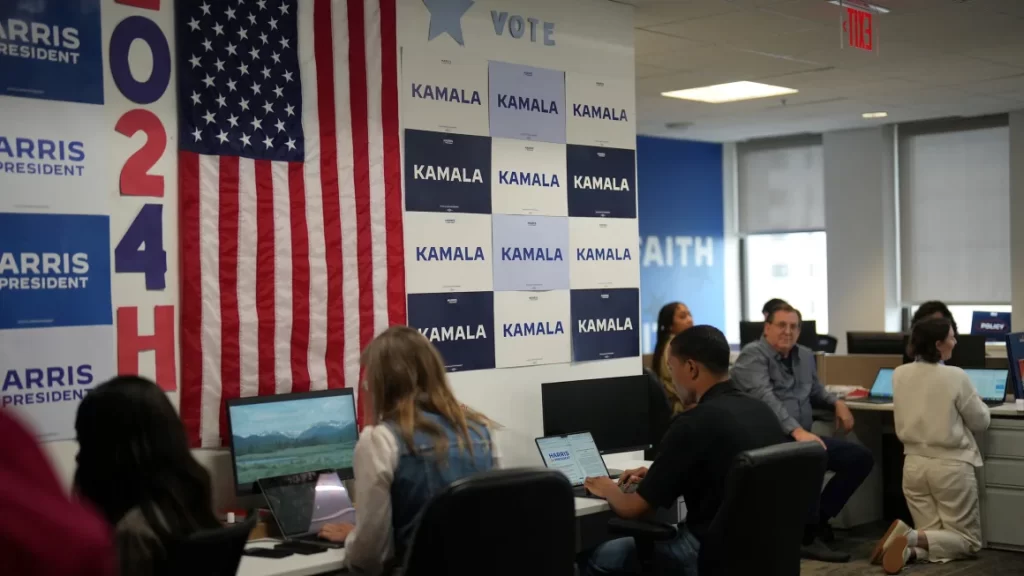The social media account @KamalaHQ, managed by Vice President Kamala Harris’ campaign, has been repeatedly called out for deceptive practices. This account, boasting over 1.3 million followers on the platform X (formerly Twitter), has been accused of manipulating video clips and captions to unfairly target former President Donald Trump.
@KamalaHQ, described by the Harris campaign as an “official rapid response page,” frequently posts irreverent and humorous content aimed at drawing attention to controversial remarks by Trump. However, several recent posts have been found to misrepresent or distort the truth.
Here are eight instances since mid-August where @KamalaHQ has been criticized for misleading content:
- Misrepresenting Trump’s Confusion About Location
On August 17, @KamalaHQ shared a clip suggesting Trump was confused about his location during a Pennsylvania event. The post stated, “Trump: Would that be okay, North Carolina? (He is in Pennsylvania).” The clip, which was brief, showed Trump referring to “North Carolina,” seemingly out of context. In reality, Trump was acknowledging supporters from North Carolina present at the event, not confusing his location.
- Misleading Clip About Trump’s Immigration Comments
On August 24, @KamalaHQ posted a video claiming Trump was confused about his location while discussing immigration. The post captioned, “Trump: ‘Pennsylvania, remember this when you have to go to vote’ (He is in Arizona).” The full video shows Trump referencing a Pennsylvania town in the context of discussing immigration issues relevant to his Arizona audience, which the Harris campaign’s clip failed to fully explain.
- Deceptive Editing of Charlottesville Comments
A post on August 30 inaccurately portrayed Trump as dismissing the severity of the 2017 Charlottesville incident. The edited clip omitted crucial context, making it seem like Trump was defending the actions of white nationalists, while he was actually commenting on the criticism of his own statements about the event.
- Misquoting JD Vance on Veterans’ Health Care
On August 31, @KamalaHQ shared a clip where Sen. JD Vance seemed to suggest privatizing veterans’ health care. The full clip showed Vance advocating for more choice for veterans without eliminating VA services. The edited video misrepresented Vance’s position by removing the context that he supported maintaining VA services while increasing options.
- Distorting Trump’s Comments on Monument Damages
On August 30, @KamalaHQ posted a video of Trump discussing penalties for damaging monuments. The post misleadingly linked Trump’s remarks to Project 2025, a conservative policy agenda, even though Trump was recounting a false claim about signing legislation related to monument penalties, not discussing Project 2025.
- Selective Editing of Trump’s Tax Plan
A September 5 post from @KamalaHQ claimed Trump was planning permanent tax cuts for the wealthy. The clip omitted Trump’s explanation that his proposed tax cuts included broader measures, such as eliminating taxes on tips and Social Security benefits, which would affect a wider audience than just wealthy donors.
- Omitting Context in JD Vance’s Union Comments
On August 29, @KamalaHQ shared a quote from Vance about Republicans being occasionally anti-union but omitted the critical part where Vance clarified that he and Trump did not fit this description. The selective editing created a misleading impression of Vance’s stance on union issues.
- Misrepresenting a Trump Ally’s Comments
On August 28, @KamalaHQ quoted Jack Posobiec, a Trump ally, and falsely attributed his comments to Project 2025. Posobiec’s statement, which did not mention Project 2025, was used to suggest he was discussing the think tank’s policies, which was not the case.
The Harris campaign has defended these posts, often citing their interpretations or arguing that context was clear enough. However, the consistent pattern of selective editing and misleading captions raises concerns about the accuracy and integrity of their rapid response strategy on social media.
In conclusion, the recurring issue with @KamalaHQ’s posts illustrates a troubling trend of using deceptive tactics to influence public perception. As scrutiny intensifies, it becomes crucial for campaigns to ensure their communications are both accurate and transparent.

